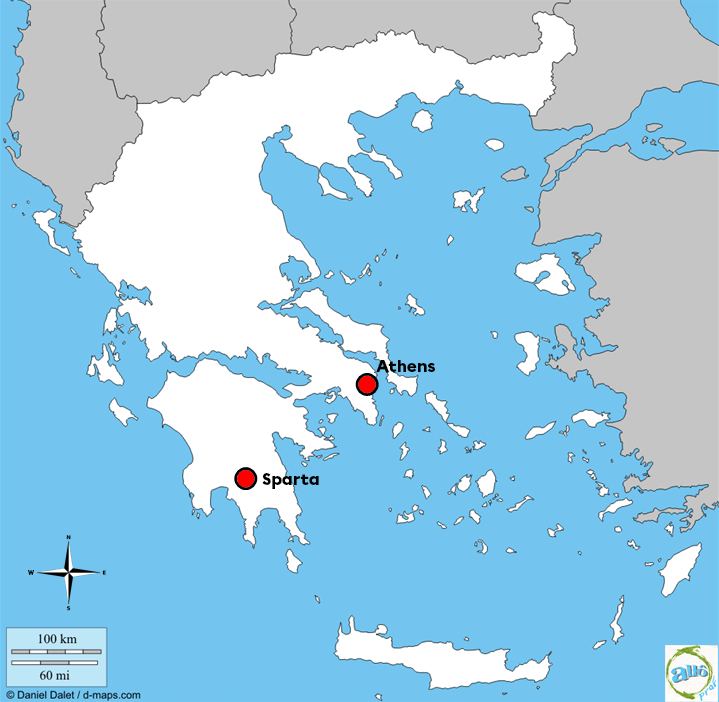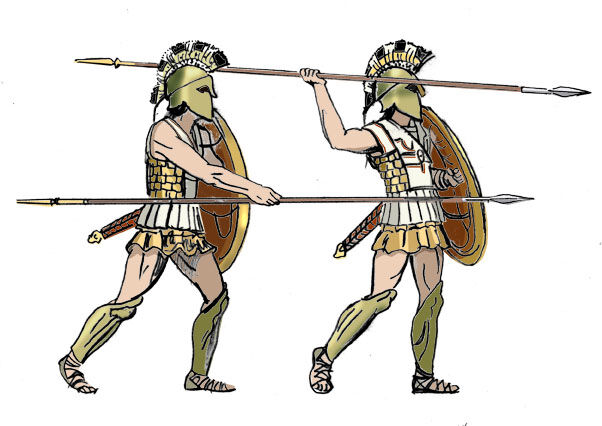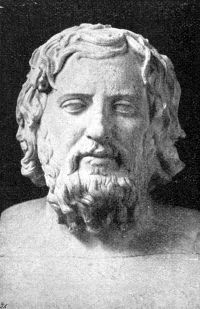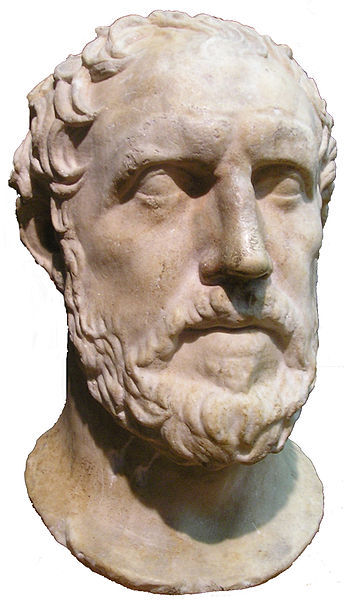The concepts covered in this concept sheet go beyond those seen in secondary school. It is intended as a supplement for those who are curious to find out more.
Sparta was one of the great cities of Antiquity, alongside Thebes and Athens. It was founded around 730 BC. Frequent and violent disagreements between citizens forced the city's leaders to create strict regulations advocating absolute obedience to the city-state. These reforms transformed Sparta into a militarized city.

There were frequent rifts between the cities of Sparta and Athens, and although the two Greek cities fought together during the Greco-Persian Wars (wars against the Persians), they later fought each other in the Peloponnesian War, in which Sparta was the victorious city.

The city of Sparta is surrounded by the Taygetos mountains
Around 148 BC, Sparta, weakened by its many wars, finally bowed to the Achaeans, a tribe from a region of western Greece. Sparta remained under Roman rule until its complete destruction by the Visigoths in 395.
Sparta preaches the importance of the state, the city, over the individual. The citizens of Sparta (the Spartans) must therefore be subordinate to the good of the city. The Spartans were divided into three distinct social groups: the citizens ("Equals"), the Perioeci and the helots.
The Equals were warriors who could not be workers or merchants. They were citizen-warriors.
The Perioeci were free men, but they lived in the mountains, withdrawn from urban life. They paid income tax to Sparta, but could not sit in the Assembly of Citizens or vote.
Finally, the helots were not free; they were slaves whose masters were Spartan citizens. The helots had to pay a fee to their master (a sum of money) and could keep the rest. Despite the good behaviour of these slaves, they were whipped once a year as a reminder of their inferior status.
The education of Spartan children remains to this day one of the strictest and most punitive in the history of humanity. Among other things, only healthy newborns were allowed to survive. A baby that was too weak or too puny (skinny) was thrown into a pit known as the Apothetes. The decision whether or not to keep the child did not rest with the parents, but with the Elders of the city. Surviving children were not brought up by their parents either. At the age of seven, the state took charge of the children. Boys had to obey military regulations. They had to live, eat, sleep and exercise in groups.
They quickly learned the art of survival, combat and absolute obedience to their group leaders. The children learned only the bare minimum of reading and writing. The emphasis of their education was on physical activity and warfare. Throughout their young lives, Spartans had to practise military exercises, get by in the wilderness, deal with the harshest elements and so on. The ultimate aim of this training was to turn Spartan children into elite soldiers.
Throughout the period of Antiquity, Greek soldiers were known as hoplites. This type of infantryman was heavily armed with a helmet, shield, javelin and short sword. In some cases, they wore a breastplate and leggings. The Spartan soldier is simply an over-trained hoplite.

Spartan hoplites (warriors)
The education of young girls is similar in many ways to the education of their male counterparts. Girls were also expected to obey state educators. Gymnastics and athletics were central to the curriculum. According to the Spartans, girls had to harden their bodies in order to give birth to healthy babies.
Discipline, rigour and obedience to the State remained the watchwords of the young Spartan. This regime made the Spartan the most feared soldier of Antiquity.
Xenophon was a Greek philosopher and general. Born in Athens in 430 BC, he came from a wealthy family. His many journeys throughout Greece gave him a thorough knowledge of the great cities. He first lived in Thebes, before settling in Athens. He became a respected and renowned philosopher after studying under the great Socrates for three years.
Xenophon later abandoned philosophy for a life of war. He helped one of his good friends (Cyrus the Younger) dethrone his brother at the head of the Persian Empire. Xenophon left for Babylon with 10,000 Greek mercenaries (soldiers), where he successfully completed his mission. Back in Athens, he learned of the death of his master Socrates, who had been poisoned by the Athenian Assembly following a trial. Furious, Xenophon decided to leave for Sparta and joined its army. Following this betrayal, Athens banished him from the city. In the years that followed, he wrote The Republic of the Lacedemonians, in which he emphasised the advantages of the Spartan military regime.
He lived in Sparta for 20 years and wrote the Anabasis, a chronicle of his expedition to Babylon with 10,000 men. Xenophon died in 355 BC.
Thucydides was a Greek politician and historian who lived between 460 and 395 BC. He is best known for the History of the Peloponnesian War, which he wrote in the 5th century BC. He describes the events of the war between the Peloponnesian League (led by Sparta) and the Delian League (led by Athens) between 431 and 404 BC. However, Thucydides' work remains incomplete, as it only covers the first twenty years of the conflict.

